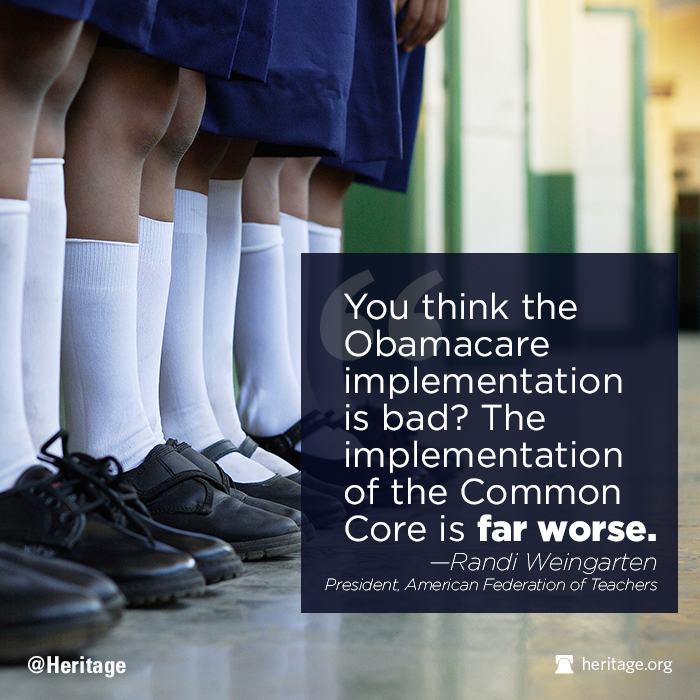“You think the Obamacare implementation is bad? The implementation of the Common Core is far worse,”said American Federation for Teachers president Randi Weingarten at the National Education Writers Association last month.
Though she is ostensibly supportive of national standards, Weingarten joins a chorus of concern about the push for Common Core standards and tests and their hasty implementation.
In May, Weingarten called for a moratorium on the stakes associated with the Common Core assessments—effectively requesting that no penalties be levied on teachers whose students fare poorly on the new tests—stating that when it comes to educational decision making, “they simply don’t get it in Washington.” She proposed at least one year of field testing the standards.
“Fifth-grade teachers, for example, have been told to follow a new, scripted 500-page curriculum pretty much to the letter. It’s an inexcusable information dump,” she writes.
States are already being saddled with the tremendous compliance burdens caused by the national standards and tests.
In August, North Carolina’s Lieutenant Governor Dan Forest exposed the bureaucracy behind Common Core when he asked the state’s Department of Public Instruction (DPI) 67 questions about the standards. He was told by the DPI it would take 10,000 sheets of paper to answer. Forest sent the DPI 10,000 sheets of blank paper. They sent him back 40,000 sheets “with a cover letter that referred him to 134 separate websites, linking to over 100 separate pages, 320 separate reports, hundreds of original source documents, 40 presentations, 1 blog post and a thumb drive.”
Bureaucratic compliance is second only to the financial burden imposed on taxpayers. The Pioneer Institute estimates that Common Core implementation would cost the 46 states that have signed on to the standards $16 billion over the next seven years.
Early adopters New York and Kentucky were met with problems at the end of the last school year. Kentucky discontinued scoring portions of the Common Core–aligned exams because of the complications with the standards. New York saw scores plummet. A June letter from 49 New York principals to the state education commissioner forewarned the problems students were facing with the new Common Core–aligned assessments.
Weingarten argues that the problem with Common Core implementation is due to lack of opportunity to adequately prepare teachers and a lack of “resources.” But as the Obamacare website debacle shows, program implementation is not the government’s forté. Centralizing education further distances decision-making authority from those closest to the children, those who know the children best: parents and teachers.
The last half-century of increased federal intervention in education has demonstrated that top-down programs impose a tremendous burden on state and local governments. The implementation problems plaguing Common Core are a symptom of a deeper problem of centralized education policy. While the 2014–2015 implementation deadline looms, states still have time to reject the standards and reclaim their educational decision-making authority.
link: http://blog.heritage.org/2013/12/10/afts-weingarten-common-core-imp...

You need to be a member of First Coast Tea Party to add comments!
Join First Coast Tea Party